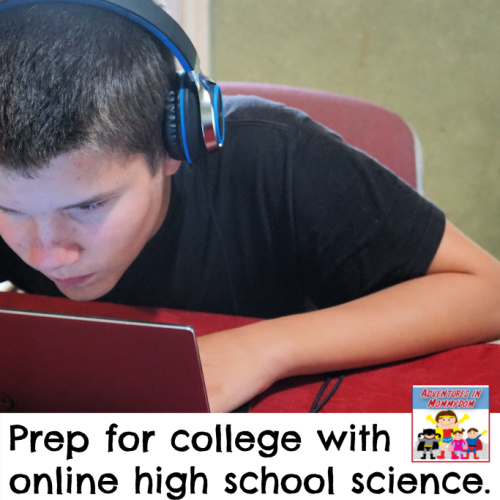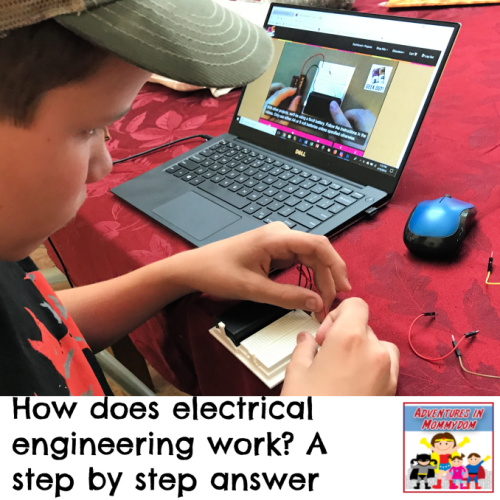As my kids have grown older I’ve really wondered, why it is you never see high school posts. There are a plethora of science lessons for younger kids. I’ve got loads of them on my site, and for all these years, I’ve been wondering why that is. Now I know.

(there are a few affiliate links in here)
High schoolers are just recreating the same experiments we did when younger
Going through our textbooks, a lot of our experiments are the same as what you do with younger kids. Watching baking soda and vinegar react, or any of the other dozens of experiments we’ve done before.

Only now, you’re working deeper into the why. Why does this work, why did the chemicals interact?
Do you know what makes for a boring post?
A few words of fun messy science, and then paragraphs of me saying, “then my kids balanced formulas or drew out what the bacteria looked like under the microscope.”
I’m going to use the wrong terms
I, as a high school homeschool teacher, know enough to grade their work, and have a passing familiarity with the concepts, so I can say if they’re way off base. But honestly, I’m not a high school science teacher. This is what would happen if a history teacher taught science, I can follow the teacher manual, but I’m not going to give great insights.

I know full well this is not my area of expertise, you know who it is, and who I trust to give great content talking about a high school science material?
Bloggers I trust for high school science
Blog, She Wrote– she’s actually got a science degree, and last I’d heard was working on writing some mini-courses for how to use a microscope. I hated using microscopes in high school, so I totally wouldn’t mind this course. I trust her knowledge. I also love her course on how to homeschool high school (see my review).
Proslogion– This is Dr. Jay Wile, he’s a college professor who got interested in homeschooling after he taught several students in his college class and noticed they were doing better than his other students. He WROTE the curriculum we’re using. He’s also an incredibly gifted speaker and teacher. Last year when I went to the homeschool convention, I went to one of his talks on a whim, and then made a point to go to ALL of his other talks.
Now, I can do great at the elementary and middle school level. There are a slew of blogs that cover science well for those ages and create great ideas.
I can create fun ideas, I won’t be able to give you the in-depth WHY of how it works (though I can find a good YouTuber who can explain it).
A couple of YouTubers I trust to provide great explanations for high school science (or just fun science topics that my kids watch for fun).
YouTubers I trust for high school science

Mark Rober– I believe he is a former NASA engineer, I’m not 100% sure, I just know my sons LOVE watching his videos and he talks through the why of each of his crazy ideas.
Smarter Every Day– He has some really cool videos on physics and is a former literal rocket scientist, so he can totally make the joke, “it’s not rocket science.” I love listening to the podcast he shares with 10 Minute Bible Hour as they have very different takes on topics, and they’ll tackle topics that intersect both their interests, like siege warfare, or how the Hanging Gardens of Babylon might work, or just talk to each other.
Crash Course– these are designed to either help kids with their high school science lessons, OR they are designed for interested adults. I’m not quite sure, but the comment section is full of AP students commenting they’re watching these videos to review before the AP test.
I’m not adding anything new when I write about our science lessons
High School science lessons are complicated. They should be, and sometimes our experiments are very techinical.
Like dissection.
Actually, we hit the dissection section of Biology while in quarantine, so I’m still figuring out how I’m going to do this. I’m thinking a virtual dissection because I don’t know quite how I’d do an actual dissection with my kids.
That’s still TBD.
But, if we do an actual dissection, I don’t know if I’d post about it.
Just like I haven’t posted our microscope lessons.
I’ve tried, but it comes down to.

“Hi, I’m Ticia and I’m incompetent with a microscope between my inability to wink without using my hand to cover my eye, and my glasses, I hate microscopes. Now let me tell you how everything I did went wrong while attempting this science lesson.”
On second thought, that could be a hilarious post.
Though it might add fuel to the fire of the crazy anti-homeschoolers.
There are more than a few of those.
But, if I shared our science experiments, unlike with our elementary science lessons, mine wouldn’t be a twist on what the book said to do, mine would just straight-up copying the book, except where I got something wrong and we had to fix it (that happens a lot more than I want to admit).
No joke, one of our experiments for osmosis this year was the famous rubber egg experiment (you know like you did in elementary, but with more science). We attempted it, and I was talking about how you can watch it bounce if you drop it from a very low height, like an inch or so. Which was all well and good, until my second child tried to bounce the egg, and it shattered all over. It made for a great Instagram post.
By the time you get to high school many homeschool moms are outsourcing their science
This is probably the most common reason why.
It’s certainly going to become mine soon. High school science needs specialized equipment to do the experiments properly.
Equipment that can cost hundreds of dollars. I got our microscope on sale from Amazon during Prime Day, and it was still more than $100 (I don’t remember the actual price, it was a year ago, but it was more than half off).
Here in the Austin area (I recognize Texas is big enough this is not true for all of Texas), most moms either have their kids enrolled in science at their co-op, they go to One Day Academy, or they’re enrolled at the local community college for dual enrollment.
I plan to have my kids go for the dual enrollment plan as soon as I can. We went to the informational seminar in February, the only reason we’re not actively looking at enrollment is the quarantine hit right as we were about to sign up for the entrance test.
Life is weird now.
Science ideas for junior high and younger
I’ll admit, some of these were redone this year in our biology textbook.





- High School Science Labs (a great solution if you’re not inclined to do them yourself)
- Physics science experiment (potential energy)
- Online High School Science
- Electrical Engineering with EEME
- Physics science experiment (law of momentum)
Do you agree with my assessments? Any suggestions for other places to look?
The post Why you don’t see high school science experiments appeared first on Adventures in Mommydom.

